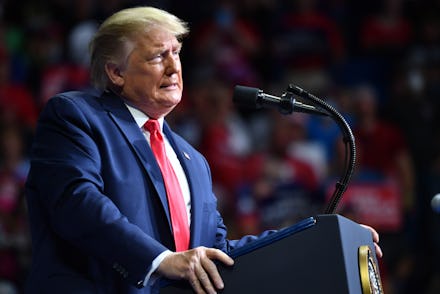After his Tulsa rally falls flat, Trump is back to arguing about crowd sizes

While over the weekend, coronavirus cases surged, President Trump went ahead with his planned campaign rally in Tulsa, Oklahoma. The Saturday rally was in direct contradiction to reopening plans, and Trump's campaign made little effort to address public health outside of making attendees sign a coronavirus disclaimer. But even with all of the fanfare heading into the weekend, Trump's campaign only managed to draw a tiny crowd.
Heading into the weekend, Trump hyped up his rally, tweeting that "almost 1 million people" requested tickets. The event was planned for the BOK Center, which the Tulsa Fire Department says can hold about 19,000 people, The Hill reported. And while a Trump campaign official told the outlet that 12,000 people "went through metal detectors" at the arena, fire marshals estimate the rally's real attendance was about half that.
See, people going through metal detectors aren't necessarily rally attendees. The Tulsa Fire Department's public information officer, Andrew Little, told The Hill that a recorded tally for the event came out to 6,200. That number only includes scanned tickets for the event, so it doesn't count media, campaign staff, or those who were in box suites — thus likely giving a more accurate picture of how many Trump fans actually showed up.
Trump's obsession with crowd sizes has been evident throughout his presidency — in fact, it started the day he was sworn into office. While crowd scientists estimated that Trump's inauguration crowd was about a third of the size of the crowd at former President Barack Obama's inauguration, then White-House Press Secretary Sean Spicer was trotted out that same weekend to declare that Trump drew "the largest audience to ever witness an inauguration, period." Spicer's claim was visibly and verifiably untrue.
On Twitter, Brad Parscale, Trump's 2020 campaign manager, tried to blame Saturday's small crowd on radical protesters and the press. However, other reports credit K-pop fans with disrupting Trump's rally, as well as teens on TikTok who reserved tickets to the event with no intentions of ever showing up.
"Actually you just got rocked by teens on TikTok who flooded the Trump campaign [with] fake ticket reservations and tricked you into believing a million people wanted your white supremacist open mic enough to pack an arena during COVID," Rep. Alexandria Ocasio-Cortez (D-N.Y.) wrote in response to Parscale's tweet.
Even before Saturday, Trump's rally was a mess. Originally planned for Juneteenth, Trump changed the date after receiving intense backlash. Many noted that plans to hold a rally on Juneteenth are generally ill-advised — but especially when the proposed location is Tulsa, the site of a racist massacre. A little over 100 years ago, white mobs killed hundreds of Black people in the city's Greenwood District, otherwise known as "Black Wall Street".
On his way into the rally, Trump was reportedly warned that crowds were smaller than expected. But according to The New York Times, he was still stunned by the dismal size and "yelled at aides backstage while looking at the endless rows of empty blue seats in the upper bowl of the stadium."
During the event itself, Trump made a comment about lowering the number of coronavirus tests, telling the crowd, "When you do testing to that extent, you're going to find more people. You're going to find more cases. So I said to my people, slow the testing down, please."
Trump's trade adviser Peter Navarro has since claimed that the troubling comment was a joke. But it's not the only questionable remark Trump made that day. While pointing to Jim Inhofe and James Lankford, Oklahoma's senator, Trump said, "We ought to come up with legislation that if you burn the American flag, you go to jail for one year. ... We ought to do it. ... That's desecration, that's a terrible thing."
Per Business Insider, Trump's remarks on flag-burning were prompted by an incident in Portland, Oregon, where protesters took down a statue of George Washington, wrapped it in an American flag, and set it on fire. But flag-burning has historically been a way for oppressed communities to show their distress in the United States. The Supreme Court ruled that flag burning is protected by the first amendment in 1989.
Rather than condemning people for burning flags, Trump would do better to understand the civil unrest spreading across the country. But that may be too much for a president who has shared a letter calling protesters "terrorists" and threatened demonstrators in Minneapolis by saying, "When the looting starts, the shooting starts."
In any case, the fact that a rally Trump so fiercely touted was in the end less a triumphant return to the campaign trail and more a showing of his weakened support and penchant for tossing off dangerous remarks is perhaps poetic enough.